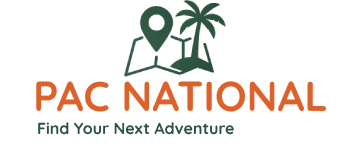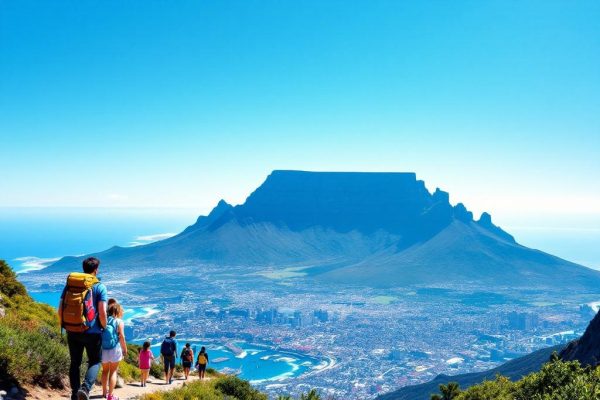How to Start a Travel Guide Career and Build a Life of Adventure
Dreaming of a career filled with adventure? Becoming a travel guide offers exciting opportunities, from leading wilderness expeditions to cultural tours. This dynamic field requires strong interpersonal skills, adaptability, and a solid knowledge base. Discover how to launch your travel guide career, build a strong portfolio, and navigate the industry’s financial landscape. Explore this comprehensive guide and start your journey toward a rewarding career in adventure tourism.
Important information

- A successful travel guide needs strong interpersonal skills, clear communication, adaptability, and problem-solving abilities. A passion for travel and cultural sensitivity are also key.
- Formal training and certifications, such as first aid, wilderness survival, and CPR, are highly recommended, although not always required. Specialized certifications can enhance your career prospects.
- Building a strong professional network through industry events and online platforms is crucial for finding job opportunities and collaborations.
- A compelling portfolio showcasing your skills, experience, and testimonials is essential for attracting clients and employers.
- Income in this field can fluctuate. Careful budgeting, diversifying income streams, and planning for seasonal changes are vital for financial stability.
Starting a Travel Guide Career: A Path to Adventure
Dreaming of a job packed with adventure? Becoming a travel guide might be your perfect fit. This dynamic career offers diverse opportunities, from leading wilderness expeditions to sharing historical insights in bustling cities.
Research the industry and explore the various guiding roles available.
Gain practical experience through personal travels, volunteering, or internships.
Obtain valuable certifications, such as first aid and wilderness survival, while specialized guiding techniques enhance your credibility.
Network with industry professionals and build a strong online presence, which are crucial in this competitive field.
Choose to work for an established tour company or embark on the exciting journey of starting your own guiding business.
Self-Assessment: Are You Ready for a Travel Guide Career?
So, you’re dreaming of a career as a travel guide? That’s fantastic! But before you leap, take an honest look at yourself. A genuine love of travel is essential. Equally important is an understanding of diverse cultures and strong interpersonal skills. Think about it: can you handle curveballs? Adaptability is a must in this dynamic field. Your knowledge base matters too. A solid grasp of geography and history is key, along with familiarity with local rules and customs. Leading groups presents its own set of challenges. Are you comfortable speaking publicly and managing different personalities? Honest self-reflection is crucial to determining if this demanding, yet rewarding, career path truly aligns with your skills and passions. Consider these key qualities:
Essential Skills
- A genuine love of travel, you should truly enjoy exploring new places and sharing your enthusiasm with others.
- Strong interpersonal skills, you’ll be interacting with people from all walks of life, so patience, empathy, and excellent communication are vital.
- Adaptability, unexpected situations are bound to arise, so being able to adjust your plans and maintain a positive attitude is essential.
Knowledge Base
- Solid grasp of geography and history, a deep understanding of the places you’ll be visiting will enrich your tours and impress your travelers.
- Familiarity with local rules and customs, respecting local traditions and regulations is crucial for a smooth and positive travel experience.
- Public speaking and group management skills, leading a tour requires confidence in front of a crowd and the ability to handle different personalities with grace.
Honest self-reflection on these qualities will help determine if this demanding, yet rewarding career is right for you.
Understanding the Role of an Adventure Tour Guide
Adventure tour guides lead groups in thrilling outdoor pursuits, such as hiking, kayaking, and rock climbing. They prioritize safety, provide expert instruction, and share their nature expertise. While the job requires long, irregular hours and extensive travel, the booming adventure tourism industry creates a high demand for qualified guides. This is especially true for those with specialized experience. It’s a rewarding career for those passionate about the outdoors and sharing adventure with others.
Exploring Adventure Interests and Career Paths
Finding the right adventure career starts with understanding yourself. Adventure tourism offers diverse roles, including adventure guiding, cultural interpretation, and eco-tourism leadership. You might also consider specialized tours, like hiking or culinary experiences. For independence, freelancing is a good option, while working with agencies and tour operators offers more structure.Think about what truly excites you. Do you love hiking, observing wildlife, or immersing yourself in history and culture? Aligning your interests with a guiding role will create a more fulfilling career.
Outdoor Guiding Specializations
- Hiking guide,
- Mountaineering instructor,
- Kayaking expert,
- Wildlife expedition leader.
Developing a niche not only builds your expertise but also improves your career opportunities.
Identifying Your Adventure Interests
Do you love the great outdoors? What gets your adrenaline pumping—hiking, camping, rock climbing, kayaking, or maybe spotting wildlife? Discovering your passion could lead to a fulfilling career as an adventure guide, sharing your love of nature with others.
Career Opportunities as an Outdoors Guide
Love the outdoors? Consider a guiding career! Adventure, wilderness, and hiking tours are just the start. Lead kayaking excursions, teach rock climbing, or guide camping trips. You could work for an established company or become a freelance guide. Specializing in ecotourism, cultural tours, or activities like fishing and bird watching offers exciting niche opportunities. Alternatively, focus on a specific region or destination.
Career possibilities
- leading kayaking excursions,
- teaching rock climbing,
- guiding camping trips.
Specialization opportunities
- ecotourism,
- cultural tours,
- fishing and bird watching.
Numerous paths lead to a fulfilling outdoor career.
Essential Skills for a Successful Travel Guide
A successful travel guide needs a diverse skillset. Clear communication is key for effectively sharing information, ensuring travelers grasp the essence of each destination. A deep understanding of local culture, history, and environment enriches the tourist experience, bringing destinations to life. Strong interpersonal skills are vital for connecting with diverse travelers, fostering camaraderie and shared discovery. Problem-solving abilities are crucial for navigating unexpected situations and logistical challenges. Adaptability and flexibility are essential as circumstances change and individual traveler’s needs vary. Physical fitness is often necessary, especially for demanding adventure tours. Excellent organizational skills are important for planning itineraries, managing time, and ensuring smooth operations. Cultural sensitivity is paramount, promoting respectful interactions with local communities. A genuine passion for travel is infectious, inspiring tourists and creating memorable experiences. Knowing multiple languages is a definite advantage, allowing guides to connect with a wider audience.
Essential Skills for a Travel Guide
- Clear communication,
- Deep understanding of local culture, history, and environment,
- Strong interpersonal skills,
- Problem-solving abilities,
- Adaptability and flexibility.
Additional Strengths
- Physical fitness,
- Excellent organizational skills,
- Cultural sensitivity,
- A genuine passion for travel,
- Multiple language proficiency.
Communication Skills: Engaging with Tourists
Adventure tour guides play a vital role in creating memorable experiences. Clear communication is crucial for tourists to fully appreciate their adventure. It provides a comprehensive understanding of locations, safety protocols, and planned activities. Engaging storytelling further enhances the experience, bringing destinations to life and fostering a deeper appreciation for local culture and history. This allows tourists to connect with the place on a more meaningful level.
Effective Communication
Effective communication goes beyond simply providing information; it involves attentive listening. By actively listening, guides can discover tourists’ interests and personalize the tour accordingly, creating a more enriching and tailored experience. For example, a shared passion for photography could lead to a detour to a scenic overlook.
Responsiveness
Guides must also be responsive, answering questions accurately and enthusiastically. This builds trust and rapport, ultimately enhancing the entire tour and leaving a positive, lasting impression. A guide’s ability to address queries effectively contributes significantly to customer satisfaction.
Customer Service Mindset: Enhancing Tour Experiences
A customer service mindset prioritizes tourists, focusing on their needs and satisfaction to create exceptional experiences. This positive approach generates favorable reviews and recommendations. Active listening, empathy, and responsiveness are crucial customer service skills. Tour guides with this mindset excel at handling complaints and consistently strive to exceed expectations, always going the extra mile.
Problem-Solving Skills: Navigating Challenges on Tour
Travel guides need exceptional problem-solving skills to handle the unpredictable nature of their work. They face challenges like sudden weather changes, logistical hurdles, and diverse client needs, requiring them to adapt quickly, resolve conflicts, and prioritize everyone’s safety. For example, a road closure might demand a detour, requiring the guide to create an equally engaging alternate route. A lost passport necessitates resourcefulness and swift action to minimize disruption. Strong problem-solving skills are crucial for effective tour guiding, allowing guides to overcome challenges and ensure a smooth and enjoyable experience.
Training and Certifications for Aspiring Tour Guides
Aspiring tour guides should consider training and licensing, though formal education isn’t always mandatory. Courses in tourism, hospitality, or outdoor leadership enhance your qualifications, while first aid and CPR training are frequently essential. Bolster your resume with certifications, especially in guiding or specific outdoor activities. Practical experience and networking opportunities arise through workshops and mentorships, which also develop crucial skills.
Recommended Training and Certifications
- Wilderness survival training.
- Certifications from tourism organizations.
- Specialized training in areas like eco-tourism.
Educational Background
A degree in tourism management or a related field provides a strong career foundation.
Importance of Training and Licenses
Formal training is essential for aspiring guides, equipping them with crucial skills like risk management, wilderness first aid, and navigation. These programs also cover effective group management techniques, ultimately leading to safer and more enjoyable tours. Proper licensing is equally vital, ensuring guides meet industry standards and regulations, fostering professionalism and accountability within the field. A licensed guide provides a sense of security and confidence, allowing tourists to fully immerse themselves in the experience, knowing they are in capable hands.
Professional Certifications for Outdoor Guiding
First aid and CPR certifications are fundamental skills for outdoor guides.
Wilderness survival training and certifications from tourism organizations enhance qualifications.
A tourism management degree provides a solid base.
Specializing in eco-tourism, cultural sensitivity, or adventure travel adds significant value.
Specialized certifications demonstrate practical expertise.
Wilderness first aid and swiftwater rescue training are invaluable assets.
Navigating the Adventure Industry
Networking is crucial in the adventure industry. Connecting with tour operators, tourism boards, and fellow guides opens doors to jobs and collaborations. Industry events and online platforms facilitate these valuable connections.
A strong portfolio showcases your skills and experience. Include photos, videos, testimonials, and descriptions of past tours. This comprehensive overview of your abilities attracts clients and employers.
Networking: Building Professional Connections
Networking is crucial for a successful career in adventure tourism. Connect with other professionals at industry conferences and through organizations. Expand your network online via platforms like LinkedIn and Instagram. Engage with local tourism boards and businesses for referrals and partnerships. Cultivate relationships with other guides for mentorship, support, and a strong professional network.
Attend industry conferences. They are invaluable opportunities to connect with other professionals.
Join professional organizations. They provide further networking opportunities.
Connect online. Use platforms like LinkedIn and Instagram to expand your network.
Engage locally. Connect with tourism boards and local businesses for referrals and partnerships.
Network with other guides. This can lead to mentorship, support, and a robust professional network.
Creating a Portfolio: Showcasing Skills and Experiences
A compelling portfolio is essential for adventure tour guides seeking employment. It serves as a showcase of their skills and experience to potential employers, highlighting their expertise and passion for adventure tourism. A well-crafted portfolio can significantly increase a guide’s chances of landing their dream job. It allows them to stand out from the competition and demonstrate their unique qualifications.
Essential Elements of a Strong Portfolio
- Certifications and licenses, including first aid and wilderness survival training.
- Experience leading tours, detailing the types of adventures and locations.
- Testimonials from previous clients, showcasing client satisfaction and guide abilities.
- Photography and videography skills, capturing the essence of the adventures.
- Passion for adventure tourism and commitment to safety and client satisfaction.
Presenting Your Portfolio
- A professional website or online platform to showcase your work.
- A physical portfolio for in-person interviews.
- Social media presence highlighting your skills and experience.
Step 1: Gather Your Materials
Compile all relevant certifications, licenses, photos, videos, and testimonials.
Step 2: Create a Structure
Organize your materials into a logical and easy-to-navigate format.
Step 3: Highlight Your Strengths
Showcase your unique skills and experience that set you apart.
Step 4: Seek Feedback
Ask peers or mentors for feedback on your portfolio’s content and presentation.
Step 5: Keep It Updated
Regularly update your portfolio with new experiences and skills.
Financial Considerations in a Travel Guide Career
A career as a travel guide offers exciting adventures, but income can fluctuate with the seasons. To navigate these financial ebbs and flows, savvy money management is key. A well-defined budget is essential, tracking not only travel and marketing expenses but also professional development costs. This financial foresight allows you to handle income variations while building long-term security. Researching typical salaries in your region will further empower you to set achievable financial targets. Guides often earn through a combination of salaries, tips, and freelance work, making smart financial planning even more crucial. Here’s how to manage your finances effectively:
Create a detailed budget. Track all income and expenses, including travel, marketing, and professional development. Categorize your spending to identify areas where you can save.
Research typical salaries. Understand the earning potential in your region to set realistic financial goals and negotiate fair rates.
Diversify your income streams. Explore opportunities beyond basic salaries, such as tips, freelance work, or leading specialized tours.
Plan for seasonal fluctuations. Set aside funds during peak seasons to cover expenses during slower periods. This will help maintain financial stability year-round.
Invest in professional development. Allocate resources to enhance your skills and knowledge. This investment can lead to higher earning potential in the long run.
Understanding Income Streams and Budgeting
Adventure tour guiding offers thrilling experiences, but income can fluctuate with seasons, trip durations, and client generosity. A well-planned budget is therefore essential for navigating these financial highs and lows.
Budgeting for Essential Expenses
Your budget should encompass all living expenses, such as housing, food, and transportation. It should also include business costs like insurance, gear upkeep, and marketing.
Diversifying Income Streams
Diversifying your income can create financial stability. Explore supplemental income sources, like freelance writing, photography, or off-season gear rentals.
Meticulous record-keeping of income and expenses simplifies tax preparation and informs future budget planning. Accurate records are invaluable for long-term financial success.

















